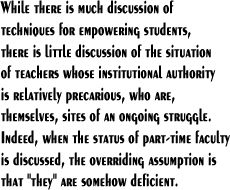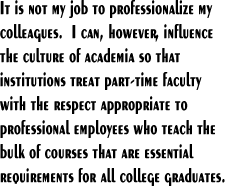Ending Abuse: Treating Part-Time Faculty
as Professionals
1.1. This presentation explores what tenured
and tenure-line
faculty can do to help transform the institutional
position of
part-time faculty. While it suggests
what we can do to end the
exploitation and abuse of our colleagues,
it is not about the
legitimation of these colleagues. They
are already legitimate,
they are already professional. My concern
is with the role of
the tenured and the tenure-track, of academic
administrators and
others with institutional authority, in the
empowerment of
colleagues who are an indispensible part
of UMKC. It is about
how "we" might become more professional in
the treatment of
colleagues who can teach "us" a thing or
two about
professionalism.
1.2. Much has been written about empowering
students, most
notably by Ira Shor in Empowering Education:
Critical Teaching
for Social Change. Shor, and
a number of so-called "critical
teachers" including Alan France, Henry Giroux,
bell hooks, and
Mas'ud Zavarzadeh dedicate their lives to
the development of
student-centered teaching. The explicit
purpose of these
Freirian theorists is to transform the political
structure of
American society, first in the classroom,
then in the university,
then in the "real world." Henry Giroux
gives a clear sense of
the priorities of empowering education:
my overriding pedagogical project
[is] rooted in an attempt at majority democratic education, that is, an
education whose aim [is] to advance the ideological and lived relations
necessary for students at least to interrogate ... schooling as a site
of ongoing struggle over the 'social and political task of transformation,
resistance, and radical democratization. (Left Margins, 11).
1.3. Giroux and other critical teachers develop
pedagogical
theories designed to change and heighten
student consciousness of
political oppression. But they typically
assume that the
teachers stimulating students to address
schooling "as a site of
ongoing struggle" are themselves in a position
stable enough to
withstand any degree of student-centered
critique. While there
is much discussion of techniques for empowering
students, there
is little discussion of the situation of
teachers whose
institutional authority is relatively precarious,
who are,
themselves, sites of an ongoing struggle.
Indeed, when the
status of part-time faculty is discussed,
the overriding
assumption is that "they" are somehow deficient.
1.4. In a rather gloomy essay on "Composition
Studies" in
Redrawing the Boundaries (1992), Richard
Marius, then director
of the Harvard Writing Program, argued that
"the critical,
intractable problem [with college level writing
programs] is that
the teaching of composition in four-year
schools is still
relegated to part-time adjunct faculty whose
pay is lousy, whose
institutional loyalty is nil, and whose shifting
ranks make it
almost impossible for any writing program
to develop a stable and
trustworthy core of mentors" (467).
Marius is right about the
pay. But he is wrong about the loyalty,
the stability, the level
of trustworthiness: many of our part-time
and non-tenurable
full-time faculty have been teaching at UMKC
as long as many of
our senior, tenured faculty.
1.5. Part-time faculty are paid so little
because it is
convenient for those with power in the institution
(like Marius
and others I could quote) to regard them
as temporary, shifting,
unstable. Furthermore, the work they
do is held in low esteem.
The general attitude is that almost anyone
can teach English
Composition. If you can read and write,
hey, go get 'em (this
was exactly the attitude of the Professor
of English Literature
who gave me my first teaching assignment
at Rutgers University in
1985). The assumption is that composition
teachers teach "basic"
reading and writing, spelling, comma-use,
etc. Many Composition
theorists perpetuate this assumption through
the use of
offensively simplistic grammar handbooks
and textbooks. It is
convenient for colleagues to ignore that
we actually teach
essayism, perspectivism, relational, mediation-based
thinking,
and negotiations between personal, academic,
and cultural ways of
thinking.
1.6. But, back to the issue of stability.
Academia has different
attitudes about coming and going, depending
on who is doing the
moving. It is about the difference
between those labeled
"professionals" and those labeled "workers."
When tenure-line
and tenured faculty come and go, we see them
as taking part in
the national and international exchange of
expertise that is one
of the most celebrated aspects of academic
culture--when
part-time faculty are forced to come and
go, commuting between
UMKC, Park University, Johnson County Community
College, and so
on, in order to piece together a living wage,
we regard them as
jobbers, as a mobile work-force that will
travel at our
convenience, at times convenient to us, at
a wage that is as low
as we can get away with. And we get
away with it, in the
collective conscience of the institution
(which has allowed us to
establish a long tradition of paying fast-food
wages), because we
regard their work as almost beneath the mission
of the
university. While part-timers fulfill
functions that are
intrinsic to our profession, to the work
of the academy as a
professional institution, they are treated
as workers, as
laborers who are interchangeable, as so many
warm bodies to stand
behind the teaching podium. Unfortunately
the history of
Composition supports this attitude.
1.7. Since the rise of Composition studies
in the American
academy in the mid-nineteenth century, English
departments
traditionally have treated the teaching of
Composition as an
afterthought. When I studied the history
of Composition teaching
at the University of North Dakota, Grand
Forks, in order to
figure out why the relationship between tenure-line
faculty and
non-tenure line faculty was so unprofessional,
I discovered that
the first teacher of English Composition
at UND was a faculty
wife who refused to accept pay for her services.
She was called
in to teach Composition because her husband
and his colleague
(the two professors who constituted the University's
English
department in 1882--at the time the student
dorm was a row of
abandoned rail-cars) were appalled by the
reading and writing
skills of their students. They were
not, however, willing to
stoop beneath the teaching of Shakespeare
and Milton, so they
enlisted Ms. Merrifield as a volunteer.
It wasn't until 1910
that we have a record of someone being paid
a nominal fee for
teaching students to write academic prose
in a way that was
acceptable to the tenure-line faculty.
1.8. The story gets better, but it took some
creative thinking.
In 1994 the Director of Composition at UND
convinced the
Department, the Dean, and the Chancellor
to create eight
full-time positions (with a 4/4 teaching
load) with benefits, job
security, and a salary of $24,000 a year
(i.e. $3,000 per
course). This was Grand Forks, North
Dakota in 1994. When I
arrived in the summer of 1995, the situation
of some of the
non-tenure line faculty led me to convince
the Dean that we
should create two more positions and that
we should allow
part-timers to share positions: two part-timers
could each teach
a 2/2 load, earn $12,000, have job security
from year to year,
and (here's the tricky bit) they could decide
who would get the
benefits. Not an ideal solution, but
it opened an era during
which part timers (first six, then as many
as twelve) who wanted
to remain part time could work out deals
with the administration
at their own convenience.
Why the Professional Treatment of Part-timers
is Essential
to UMKC's Pursuit of Academic Excellence
2.1. By treating part-time faculty at UMKC
as professionals, we
would achieve national recognition as one
of the rare academic
institutions that is genuine about "celebrating
a community of
learners", "celebrating a campus without
borders", "celebrating
human potential", and "celebrating academic
excellence" (to quote
from the first page of UMKC's 1999-2000 Annual
Report).
2.2. Academic excellence is achieved in the
three-way
relationship between research, service, and
teaching. A
university that pursues national recognition
as a research
institution must support faculty who have,
or are attempting to
achieve, sufficient national and international
prestige to be
highly marketable. It must also support
teaching faculty who are
deeply familiar with local conditions.
Some tenure-line faculty
pursue excellence in teaching, research,
and service not because,
or not solely because, they are part of their
job descriptions,
but because they recognize the necessity
of dynamic interactions
between and among the different parts of
academic culture. It is
also why they celebrate and teach dynamic
interactions between
and among personal, academic, and sociopolitical
cultures,
philosophies, beliefs, theories, practices.
A healthy academic
institution encourages and rewards not only
those who engage
actively in this dynamic game, but also those
who make this game
possible. A healthy university recognizes
that its workers
fulfill a range of crucial, interdependent
functions and that the
abuse and neglect of one part of the workforce
impacts all parts
of the institution.
2.3. Our non-tenure-line teaching colleagues,
both part- and
full-time, lessen the burden on tenured and
tenure-line faculty
whose functions are more evenly divided between
teaching,
research, and service. Our colleagues
are here because they are
good teachers, some of the best that the
institution employs.
Often they have experience in pre-college
education (a rarity
among tenure-line faculty) and are experts
at helping students
negotiate the difficult transition between
high-school (and
junior colleges) and the four-year research
institution. They
are willing to teach classes that meet at
inconvenient times and
that come up at the last minute due to fluctuations
in
enrollment. And they step in when colleagues
go on leave. Part
time faculty also provide informal and formal
mentoring for new
faculty and GTA's. They are full of
invaluable institutional
memories. They are dynamic members
of committees. They are
profoundly responsive and dependable.
What more could we ask?
That they increase profit margins?
Well, so they do! And they
would continue to do so if they were paid
$4000 instead of the
current $1800 per course.
2.4. While a number of part-timers teach introductory
courses
required for English majors, the bulk of
their teaching is in
composition. In Fall 2000 non-tenure
line faculty taught
forty-six sections of English composition
including fifteen
writing-intensive courses (Theory and Practice
of Composition;
Writing and Technology; Writing and the Academy;
Writing in
Cultural Contexts). In Winter 2001
they are teaching forty-five
sections. With an average of twenty-three
students per section,
non-tenure line faculty in English teach
more than 2,000 students
a year. Add the number of students
per semester in PACE (Program
in Adult Continuing Education) courses and
in summer courses and
the number approaches 2,500.
2.5. Despite the nineteenth-century beginnings
of composition
instruction, which suggest composition teachers
did the job out
of obligation and love, part-time faculty
are now professional
teachers of college-level reading and writing.
As I have
suggested, they are disempowered by the institution's
lack of
professionalism. It is not my job to
professionalize my
colleagues. I can, however, influence
the culture of academia so
that institutions treat part-time faculty
with the respect and compensation appropriate to professional employees
who teach
the bulk of courses that are essential requirements
for all college graduates. While GTA's and tenure-line faculty are
fulfilling
the requirements of a program of study or
a promotion-process,
part-time faculty and full-time instructors
are teaching,
teaching, teaching. And, when they
are not distracted--by
medical bills, heating bills, computer glitches,
car payments,
telephone systems that interrupt five people
in order to contact
one, and meetings that extend the hourly
commitment while
reducing the hourly wage--they think about,
and work with,
individual students. Many of these
students will not stay at
UMKC if they can't figure out how to read
and write an academic
essay. Many of these students tell
us repeatedly that English
110 and 225 made them feel welcome at UMKC.
Many of these
students get paid more than their part-time
teachers by working
at McDonald's.
2.6. Let me conclude by asking a question
and proposing an
answer. What does UMKC gain from the
part-time faculty? In many
cases these teachers are the mainstay of
our academic programs.
They teach the bulk of our required courses.
They allow tenured
and tenure-line faculty to take research
leaves and to teach
reduced loads. They ensure that we
have time for community
service. They provide models of what
it means to dedicate a life
to teaching. Even though they are treated
like dispensible
fast-food employees and are hired semester
to semester without
the protection of health care, job, office-space,
private telephone
lines, and other "privileges," part-time
teachers provide a deep,
complex tapestry of historical and cultural
memories that rival
those of our most distinguished senior professors,
staff, and
administrators.
Stephen Dilks (dilkss@umkc.edu)
is Director of Composition and
Assistant Professor of English and Irish
Literature, University
of Missouri, Kansas City |


|
![]()
